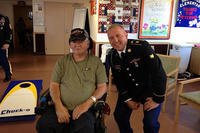Say goodbye to your chance of sitting next to an emotional support peacock, miniature horse or pig on a U.S. airline.
The Department of Transportation issued a final rule Wednesday that allows airlines to restrict animals in passenger cabins to service dogs -- defined as any dog, regardless of breed, trained to help its handler with a physical, psychiatric, intellectual or mental disability.
Read Next: Former Navy Seal, Wife, Sue VA Over New Caregiver Program Rules
All other animals will be classified as pets, and either must go into the cargo hold, be small enough to fit into a vented carry-on bag that fits under an airplane seat or left at home.
The rules are a double win for military veterans. They address concerns over the rise of untrained animals and pets carried onto planes as "emotional support animals" that pose a safety threat to their service dogs; and grant the inclusion of service dogs for psychiatric conditions.
"It may not seem like a huge deal for everyone, but it certainly is a big deal to a veteran who is afraid to travel with their service dog because of emotional support lizards, kangaroos or fake service dogs," said Rory Diamond, CEO of K-9s for Warriors, a Ponte Vedra, Florida, organization that trains dogs to help veterans with traumatic brain injuries and mental health disorders.
The final rule, which will go into effect in 30 days, defines a service animal as a dog, regardless of breed or type, trained to do work or perform tasks for the benefit of a disabled person.
Under the new rules, a disabled person must complete a new form developed by the Department of Transportation at least 48 hours prior to flying with their dog or upon checking in, and complete an additional form if a flight is eight hours or longer certifying that their animal can hold itself for long periods of time or go to the bathroom in a sanitary manner.
The new rules allow airlines to limit the number of service animals traveling with a single passenger to two, and to require a dog to fit on a handler's lap or within the confines of the handler's foot space on the aircraft.
Airline carriers will also be allowed to require that service animals be harnessed or leashed, and to turn away any dog that acts aggressively.
The airlines can choose to continue transporting "emotional support animals" at no charge if they choose to, but given that several large airline organizations, including the Regional Airline Association, the National Air Carrier Association and the Association of Professional Flight Attendants advocated for stricter regulations, they are unlikely to do so.
In 2008, the Department of Transportation began requiring airlines to let passengers bring animals on board if they had a note from a doctor saying the animal was needed for emotional support.
The menagerie that has followed included a 50-pound pig on a U.S. Airways flight in 2014 that became disruptive before takeoff and was booted off the plane; a miniature horse, Flirty, that accompanied her handler on a regional flight from Chicago to Omaha; cats; and a squirrel, also removed from a flight.
Unusual animals prompted carriers to tighten their own rules: American Airlines banned goats, insects, ferrets and hedgehogs in 2018, while United cracked down on support animals for long hauls, barred all animals but cats and dogs and restricted emotional support kittens and puppies from passenger cabins.
Last year, Delta Air Lines and a passenger were sued when a dog bit another passenger in the face, causing damage to his lips, his gums and beneath his nose.
The Department of Veterans Affairs launched a study in 2011 about the impact a service dog may have on post traumatic stress disorder and other mental health conditions. But the research was halted after two trained animals bit children. That study was restarted, but again halted in 2012 due to problems with at least one kennel that furnished and trained dogs and concerns over health.
According to VA, the study is now complete and results have been submitted for review by the National Academies of Sciences, Engineering and Medicine.
A Purdue University study released earlier this year found that the most helpful task performed by service dogs for veterans with PTSD is disrupting episodes of anxiety.
The study found that a dog's training to alert the veteran to increasing anxiety and provide physical contact during anxiety episodes were among the most important and most used tasks during a typical day.
At least one veterans advocacy group, Paralyzed Veterans of America, did not support the proposed changes to the rules regarding service dogs and emotional support animals.
PVA lobbied for service animals to include all dogs, cats and miniature horses, and for emotional support animals to include dogs, cats and rabbits. The organization argued that passengers with disabilities who use emotional support animals should continue to bring their animals on board.
"The mere presence of an emotional support animal accommodates the person's disability, and may be crucial to allowing a person with a disability to travel by air," they wrote in a comment on the proposed rules.
Diamond said he agrees emotional support animals provide comfort to their owners but they should not take priority over dogs that enabled disabled persons to accomplish their daily activities.
"Look, I love my dog just as much as anyone else, but it's gotten too easy to go online, buy a vest and have a fake service dog," Diamond said. "We are thrilled with this new rule. We spend a huge amount of time and effort training service dogs. Now they can fly with confidence."
-- Patricia Kime can be reached at Patricia.Kime@Monster.com. Follow her on Twitter @patriciakime.
Related: Your Holiday Gift to Veterans This Year: Leave Your Fake Service Dog at Home
















